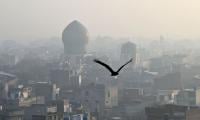Pakistan Peoples Party (PPP) Chairman Bilawal Bhutto Zardari has said that between 2013 and 2018, the neonatal mortality rate in Sindh decreased by more than 30 per cent, the infant mortality rate by 19 per cent and the under-five mortality rate by 17 per cent.
“This speaks volumes about the provincial government’s pragmatic and result-oriented healthcare policies, so we’re taking other steps to launch the Mother and Child Support Programme to register pregnant mothers at health facilities close to their homes, and provide them with cash support for each scheduled visit to the health centre.”
The PPP chief was talking to the media at the Chief Minister House on Wednesday after inaugurating the Mother and Child Support Programme launched by the Social Protection Strategy Unit (SPSU) of the CM Secretariat. CM Syed Murad Ali Shah, provincial ministers, advisers, special assistants and senior officers attended the event.
Bilawal said that according to the Demographic and Health Survey conducted by USAID and UKAID for 2013-18, neonatal mortality has increased by two per cent in Khyber Pakhtunkhwa, and decreased by 19 per cent in Punjab and 30 per cent in Sindh. Similarly, he added, infant mortality has decreased by nine per cent in KP, 17 per cent in Punjab and 19 per cent in Sindh, while under-five mortality has has decreased by nine per cent in KP, 17 per cent in Sindh and 19 per cent in Punjab.
He said that it has been a PPP tradition to always launch pro-poor policies with the objective to steer the people out of poverty. “It was Shaheed Zulfikar Ali Bhutto who had taken away lands from Jagirdars [feudal landlords] and given [them] to peasants.”
The PPP chief said his mother Benazir Bhutto had launched the Lady Health Worker Programme, which had been criticised in the initial stage but it had later earned international acclamation like the Benazir Income Support Programme (BISP).
He said BISP was not the only revolutionary programme, but under its banner, Waseela-e-Haq, Waseela-e-Rozgar and Waseela-e-Taleem were launched and they had reached out to 1.3 million people.
He added that the PPP government had also launched interest-free loans as a micro-financing facility to help those in need across the province, and that their repayment ratio had been recorded at 99 per cent.
‘Significant advances’
The CM said on the occasion that his government had made significant advances in improving the outreach and quality of primary health services aimed at maternal, newborn and child health.
He said that these WHO-recommended services, such as antenatal check-ups, safe delivery, postnatal care, child growth monitoring and immunisation are available for free at public health facilities throughout the province.
“This has resulted in improvements in key indicators such as institutional deliveries as a proportion of all rural births from 46 per cent to 62 per cent in the last eight years.” Shah said that there is still much more to be done in this regard. “Many women from poor families in remote rural communities are unable to make use of existing public health services due to the loss of income from taking time off from work, and travel costs.”
He said his government has launched the Mother and Child Support Programme to help women overcome economic barriers to making the best use of these essential services. “This is the first programme that forms a part of a comprehensive provincial social protection strategy being rolled out by the Sindh government in the coming months.”
The CM said the Mother and Child Support Programme registers pregnant mothers at health facilities close to their homes, and provides them with cash support for each scheduled visit, including the facility of institutional delivery.
“Women are supported with Rs1,000 on each scheduled antenatal, postnatal and child healthcare visit, Rs4,000 for institutional or healthcare facility-based delivery, and Rs2,000 for birth registration with Nadra.”
He said the programme aims to help mothers and children avail the WHO-recommended services. Throughout the entire period of critical care of a pregnant woman lasting up to 1,000 days, starting from conception up to the child’s second birthday, each beneficiary will get Rs20,000 throughout the continuum of care for this period, he added.
The chief executive said that as a pilot intervention, the programme has been launched in two union councils each of the Tharparkar and Umerkot districts.
“It’s being scaled up in the two Talukas of the intervention districts and will be subsequently scaled up to the entire districts in the next three months,” he said, adding that the initiative will be further expanded to cover the entire province within the next two years.
“At its peak, it aims to have over one million active beneficiaries, and targets rapid improvements in the health of mothers and children,” said the CM, and announced making the SPSU a full-fledged department that will implement the PPP’s election manifesto.
An aerial view of Karachi city. — AFP/FileChait VasraandThe Canvas Gallery is hosting an art exhibition featuring...
This representational image shows students visiting a book stall. — PU website/FileA two-day book fair, the final...
This representational image shows the entrance of the University of Karachi. — APP/FileAs many as 16,506 students...
Representational image of a house on fire. — AFP/FileA fire broke out in a dye manufacturing factory in New...
Sindh Inspector General of Police Ghulam Nabi Memon chairs a meeting at CPO Headquarters in Karachi on September 19,...
The parliamentary secretary for science and technology, Government of Pakistan, Nikhat Shakeel Khan looks down in a...







